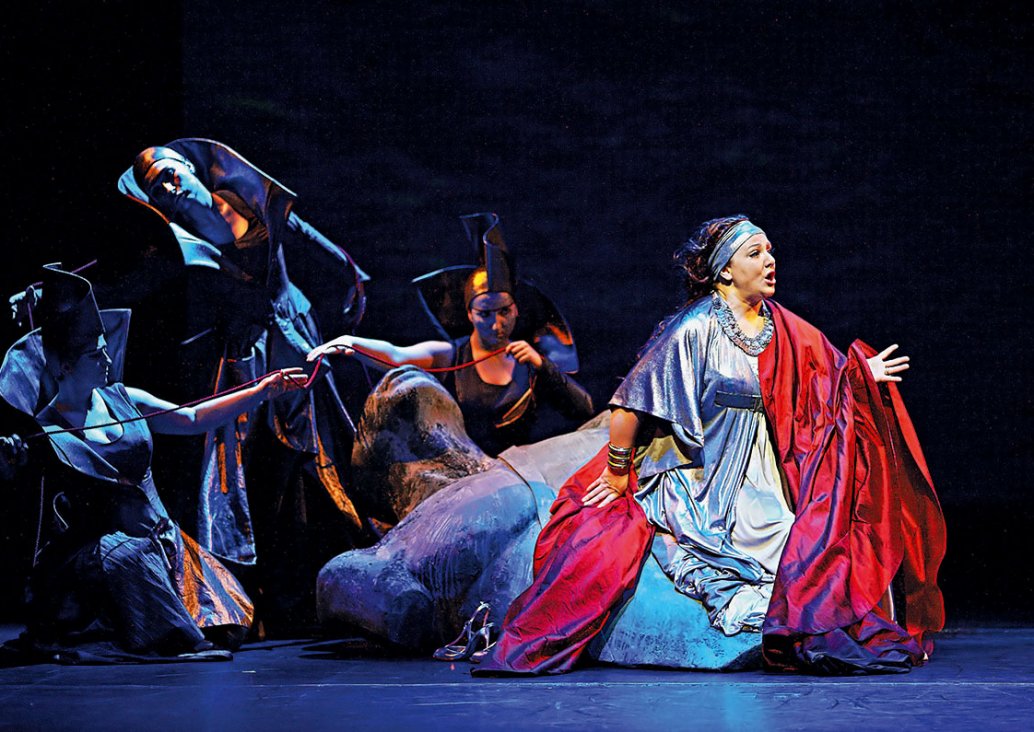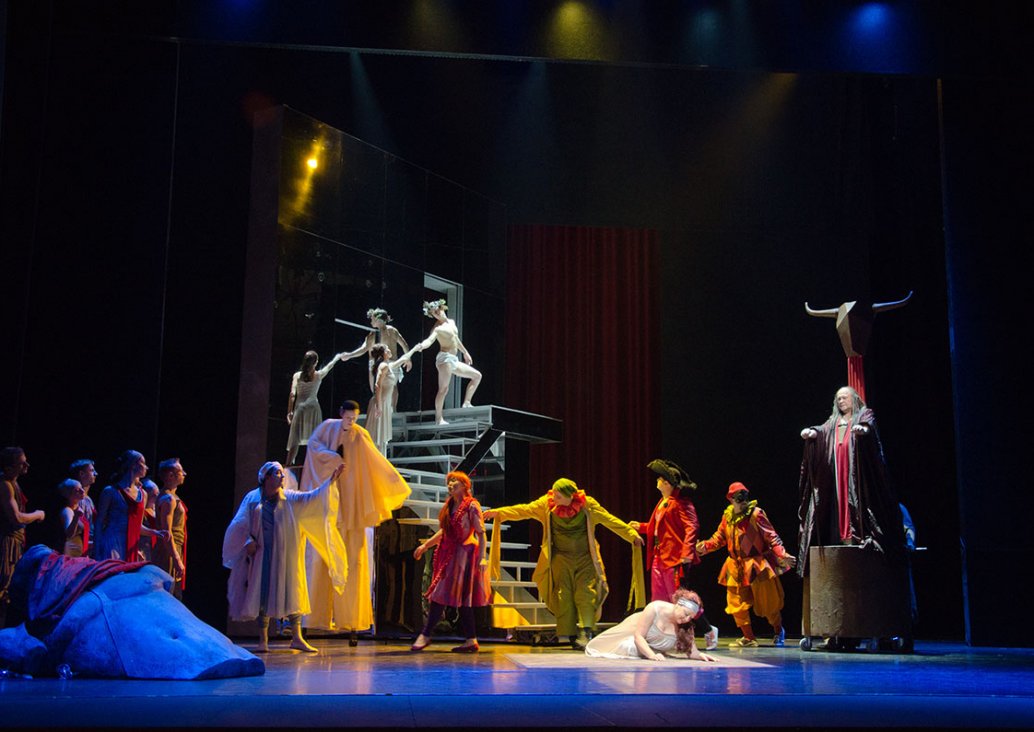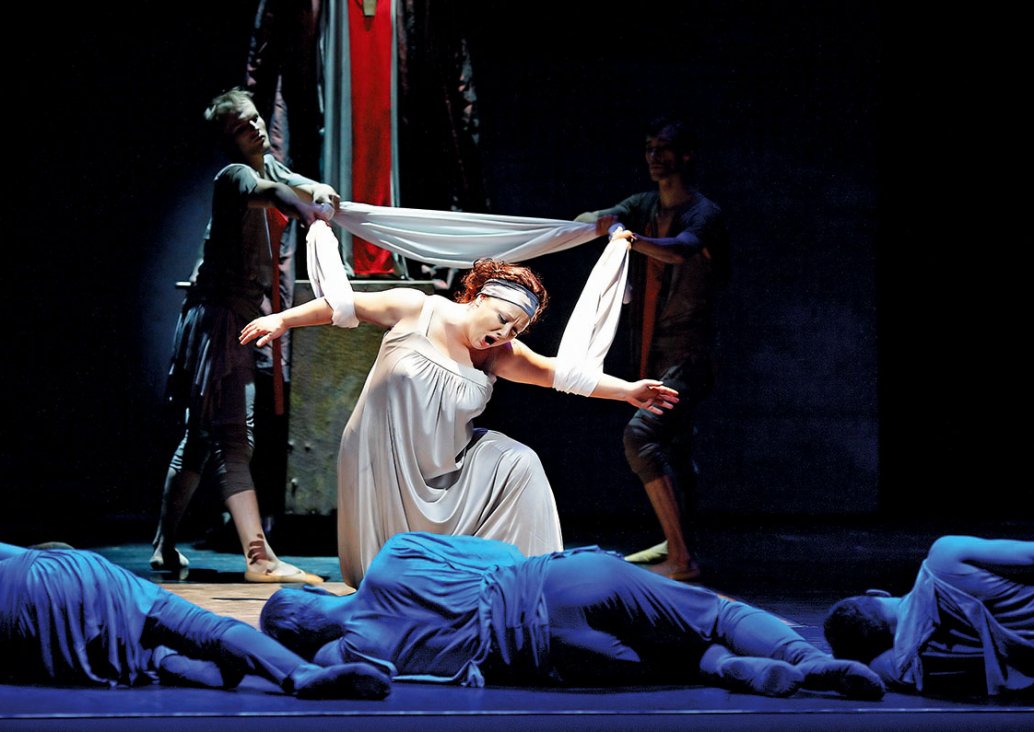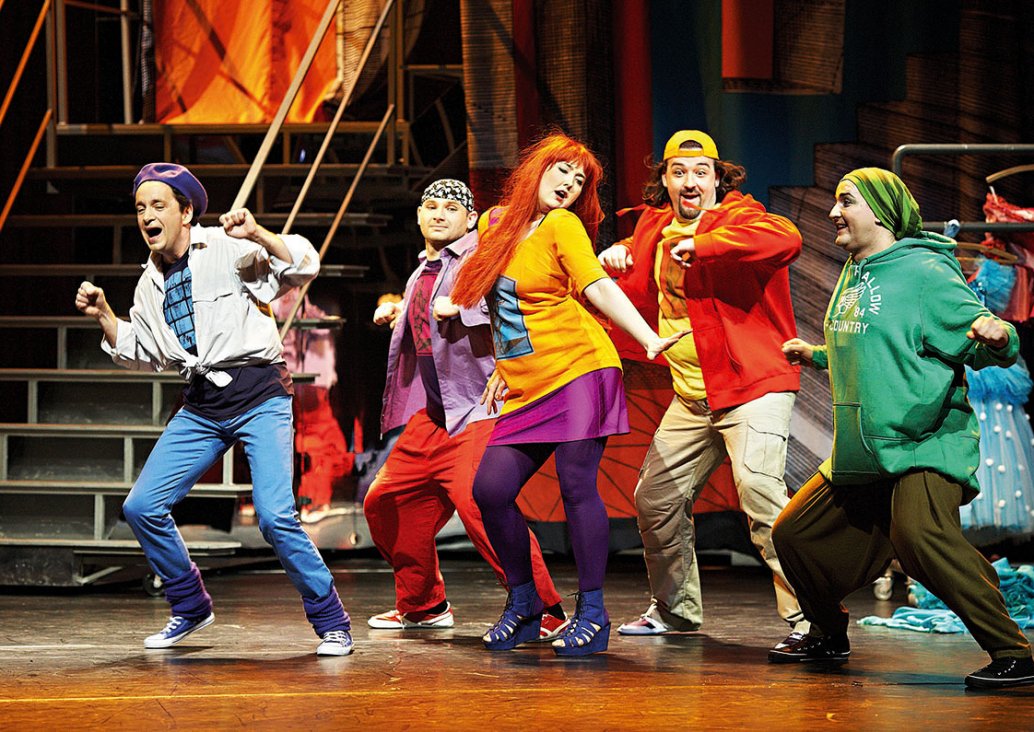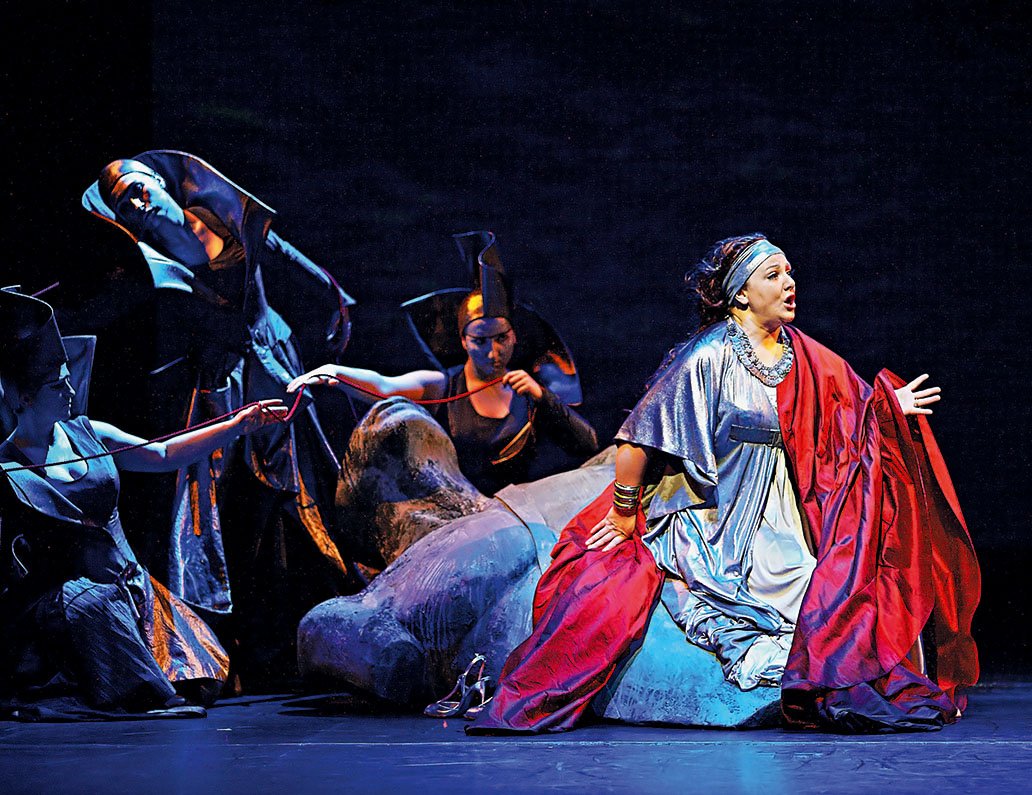
Opera
Ariadne On Naxos
Opera in one act with a prologue
Richard Strauss
Włodzimierz Nurkowski
Tomasz Tokarczyk, Warcisław Kunc
Tomasz Tokarczyk, Warcisław Kunc
2
hours
25
minutes
details
information
duration
2
hours
25
minutes
|
1
intermission
composer
Richard Strauss
libretto
Hugo von Hofmannsthal
World premiere
Vienna, Hofoper, 4 October 1916 (1st version: Stuttgart, Hoftheater, 25 October 1912)
premiere at the Krakow Opera
24 March 2012
language
Sung in the original German, with Polish subtitles
description
A spectacular show, full of ideas and surprises, harlequinades and wit in the spirit of commedia dell’arte, circus-like fantasy and the myth of the Minotaur, Venetian carnival and bacchanalia in the finale... The directors of the production were provoked to come up with this extraordinary blend by the fantastic idea underlying the libretto written by Hugo von Hofmannsthal, a celebrated German poet, considered second only to Goethe: that of combining high tand low arts, opera seria and buffa. And all this was employed to tell a story of love, both the ideal, romantic one, and that which is more mundane, sensual. The result was an intriguing work, full of fancy and imagination, with music which gathered raving reviews. After premiering in its final version in 1916, "Ariadne" gained a permanent place in the repertoires of music theatres the world over and is still doing very well today.
Poster
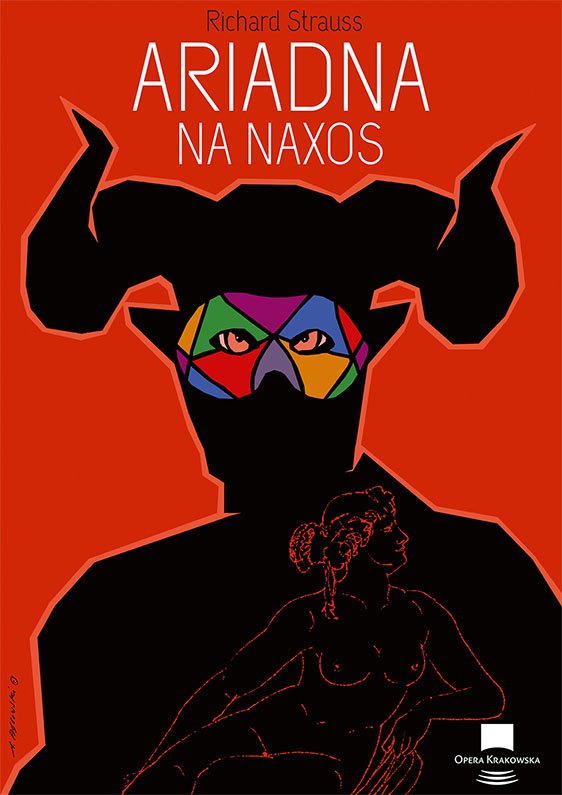
poster by
Andrzej Pągowski
producers and cast
producers
Director: Włodzimierz Nurkowski
Music Directors: Tomasz Tokarczyk, Warcisław Kunc
Set and Costume Designer: Anna Sekuła
Choreographers: Katarzyna Aleksander-Kmieć, Jacek Tomasik
Lighting Designer: Dariusz Pawelec
Director’s Assistant: Bożena Walczyk-Skrzypczak
Music Director’s Assistant: Paweł Szczepański
Set and Costume Designer’s Assistant: Adam Łucki
Choreographer’s Assistant: Mariusz Raczyński, Sebastian Kubacki
Stage Managers: Anna Jaworska, Magdalena Wąsowska
Prompters: Krystyna Behounek, Dorota Sawka
Language Consultants: Jerzy Gacek, Anna Swoboda
Soloists’ Coaches: Irena Celińska-Głodek, Kristina Kutnik, Olha Tsymbalyuk, Natalia Wasidlow
Ballet Accompanist: Grzegorz Brajner
Displayed libretto translated by Dorota Sawka
Music Directors: Tomasz Tokarczyk, Warcisław Kunc
Set and Costume Designer: Anna Sekuła
Choreographers: Katarzyna Aleksander-Kmieć, Jacek Tomasik
Lighting Designer: Dariusz Pawelec
Director’s Assistant: Bożena Walczyk-Skrzypczak
Music Director’s Assistant: Paweł Szczepański
Set and Costume Designer’s Assistant: Adam Łucki
Choreographer’s Assistant: Mariusz Raczyński, Sebastian Kubacki
Stage Managers: Anna Jaworska, Magdalena Wąsowska
Prompters: Krystyna Behounek, Dorota Sawka
Language Consultants: Jerzy Gacek, Anna Swoboda
Soloists’ Coaches: Irena Celińska-Głodek, Kristina Kutnik, Olha Tsymbalyuk, Natalia Wasidlow
Ballet Accompanist: Grzegorz Brajner
Displayed libretto translated by Dorota Sawka
cast
ticket
Category B
1st seats
Marshal's Balcony
110 zł
2nd seats
Amphitheater rows IV-IX
75 zł
3rd seats
Amphitheater rows I-III and X-XII
60 zł
4th seats
Side seats and rows XIII - XIV
Right-hand and left-hand side boxes (level 1)
Balcony level II rows I and II
40 zł
5th seats
Balcony rows III and IV
30 zł
synopsis
PROLOGUE
The palace of a wealthy Viennese. Preparations for a theatrical performance are underway. The Music Master is looking for the Majordomo to enquire if it is true that a vulgar harlequinade is to be staged right after the sublime opera seria about Ariadne on Naxos, specially commissioned for the household. The Majordomo confirms: such is the wish of his principal. The Music Master thinks that the Composer, who is his student, will never consent to this. The Majordomo has only one answer: his principal is the one who is paying for it.
Zerbinetta, one of the troupe of comedians, is visited by an Officer in the dressing room. The Composer wants to hold a rehearsal with the musicians but finds out that they are playing musical accompaniment for dinner. The Tenor is scolding the Wigmaker; the Primadonna is sending a letter to her wealthy protector. The Composer fancies Zerbinetta, and when he finds out that she is to perform in the harlequinade right after his Ariadne, he grows angry: how can crude entertainment be offered after a sublime opera? Zerbinetta and the Dancing Master, however, are of the opinion that they should perform first because, if the audience is bored and irritated by Ariadne, they will have a hard task trying to entertain them.
The Majordomo announces the most recent decision of his principal, who expects the opera and the comic intermezzo to be merged into one show, so that the whole affair is over before the time comes for the fireworks. He also expects the artists that he is paying for to prove up to the task. The Composer is crushed, and argues that Ariadne is a symbol of solitude. The more reason for her to require company, the Dancing Master replies as he believes they all need to focus on finding a solution that would please their patron. He comforts the Composer, saying that he is not the first one to experience disappointment, and advises him to shorten the score without delay. The Tenor and the Primadonna demand their roles to remain unaffected. The Dancing Master explains the plot of the opera to Zerbinetta: it is a story of a woman abandoned by her lover on an island, who then waits for another man. Zerbinetta believes her role is to arrive there
with her companions to cheer the sad heroine; the Composer attempts to explain the true meaning of his work and, in a fiery speech, extols music as the most sacred of all arts. No one pays him any attention as it is time to go on stage.
THE OPERA
Abandoned by her beloved Theseus, Ariadne lives in solitude on the isle of Naxos. Exhausted with weeping, she lies down on the rocks, observed by three sympathetic nymphs, as Zerbinetta and her companions watch her and realize it is not going to be easy to cheer her up. Ariadne cannot see them; by now, death is all she expects (aria “Ein schönes war”). Harlequin and his companions, Scaramuccio, Truffaldino and Brighella, resolve to entertain her with music and dance but Ariadne refuses to listen to them. Zerbinetta is trying to have a woman-to-woman talk with her: after all, this is the lot of all the fairer sex. Ariadne is no exception here, Zerbinetta has experienced a similar situation; all men are beasts but a woman is unable to resist them (recitative and aria “Grossmächtige Prinzessin!”). As her companions court her, Zerbinetta chooses Harlequin and they both disappear. But here come the nymphs, excited because a ship is approaching the island, with Bacchus on board. The god has fled from his lover Circe and, despite holding fond memories of her, is already looking for a new love. Ariadne at first takes him for Theseus, then for the messenger of death that she has been expecting. Charmed with her beauty, Bacchus kisses her and she feels a new love is filling her completely, which she confesses to Bacchus. When a new god arrives, we surrender without a word, is Zerbinetta’s final comment.
Jacek Marczyński, Przewodnik operowy, Świat Książki, 2011
upcoming performances of this genre
/
